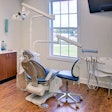
One of the key learnings from the pandemic has been the importance of emergency preparedness planning. While businesses have long recognized the need for these plans, many small businesses, including dental practices, entered the pandemic from a position of vulnerability. In fact, according to TD Bank's Small Business Recovery Survey, 81% of small business owners did not have a disaster or crisis plan in place prior to pandemic shutdowns.
Unfortunately, without proper strategic planning, many valuable practices are sold below historical fair market value because the practice owner's spouse, staff, and legal team are ill-prepared to handle an expedited sale. Additionally, production often plummets during the very time that staffing, appraising, and marketing the practice are most vital to maximizing the sale price.
 Dan Croft.
Dan Croft.While we cannot go back in time, dental practice owners can use their pandemic experiences as a catalyst to develop and/or revisit their emergency plans in case of unforeseen circumstances, such as a disability, a medical crisis, or the sudden death of an owner or business partner. In addition, as the potential threats of natural disasters, cyberattacks, fraud, and pandemics increase, disaster recovery plans become more of a priority item for a practice owner's strategic planning.
Much like having life and other important insurance policies, developing and implementing a prepared practice sale plan provides protections and assurances for the business. Here are some considerations dental practice owners should keep in mind when planning for the potential unexpected sale of a practice.
1. Industry expertise
Select a local expert transition consultant to act as a qualified adviser to quickly get the practice valued and sold. A transition consultant who is familiar with the practice and market will be in the best position to find a buyer and can even help find temporary coverage for patient appointments while the sale is pending.
2. Timing
The sooner the practice can be sold after an unexpected event, the better it will retain its precrisis value. Creating a memo of direction with the practice's estate attorney and transition specialist will help facilitate the quick sale of the practice in emergency circumstances. This document, executed by the practice owner and witnesses, clearly states who should be consulted in the event a practice owner is unable to make decisions about the sale of the practice. All doctors with any ownership in a practice (regardless of age and physical condition) should have a copy of this document.
3. Proper documentation and insurance coverage
It's crucial for practice owners to have a current will, an estate plan, and appropriate medical directives, as well as a quality disability insurance policy payable to at least age 65. Further, practice owners should secure adequate life insurance that at the very least will cover any practice-related debt, including real estate.
4. Organization
Dentists should organize and update important information about the practice and their finances on an annual basis as if preparing for a sale. A good starting point is collecting financial statements for the previous three years, a current profit and loss statement, a current lease or mortgage statement, any relevant contracts, and an inventory of major equipment. The transition consultant can also provide a complete list of necessary documents.
5. Additional support
Practice owners can also consider organizing or participating in a death and disability group. This is an organized group of doctors who will come to the aid of a practice experiencing an emergency. A formal agreement between six to 10 doctors can provide peace of mind that the practice will be immediately covered in the event of an unexpected death or disability.
Although it is difficult to think about circumstances that might cause the sudden sale of a practice, advance planning will help ensure the practice's staff, as well as the owner's family, are not burdened with finding doctors, appraising, marketing, and selling the practice for full fair market value during a time of grief and uncertainty. Additionally, this process creates the benefit of obtaining a regularly updated practice appraisal, which should help practice owners with retirement planning and developing a long-term exit strategy to maximize growth, profitability, and the practice sale price.
Dan Croft has been the head of TD Bank's Healthcare Practice Solutions Group since 2014. In this role, he is responsible for overseeing and growing TD Bank's healthcare practice finance business, which assists dentists, veterinarians, optometrists, physicians, and podiatrists in choosing sound financial solutions for their practices. Croft has more than 20 years of experience.
The comments and observations expressed herein do not necessarily reflect the opinions of DrBicuspid.com, nor should they be construed as an endorsement or admonishment of any particular idea, vendor, or organization.



















